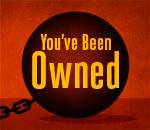Yesterday, I wrote about the Supreme Court's hearting for Kirtsaeng v. Wiley, which threatens to undermine the very nature of property itself, taking away your right to sell, modify, loan and give away any foreign-made object that has embodies one or more copyrights. The Electronic Frontier Foundation's Parker Higgins has a close reading of the judges' reactions at the hearing. It's hard to know which way they'll go:
Today the Court mirrored our concerns about the right of Americans to resell the goods that they've legally acquired — from books to smartphones to cars — just because those goods happen to contain copyrighted materials and were manufactured overseas.Defenders of Wiley's position are quick to denounce those concerns as overblown. It's curious, then, that Wiley's own lawyer, former Solicitor General Ted Olson, was hard-pressed to explain why. Justice Breyer asked about specific examples — buying a book overseas to give to your wife in the U.S., or reselling a Toyota manufactured in Japan with numerous individually copyrighted components — and did not seem impressed with the answers he got. And when Justices Breyer, Sotomayor, and Roberts questioned Olson about the "parade of horribles," raised by Kirtsaeng and supporting amici (including EFF), he asserted that, yes, indeed, sales of foreign made goods might require approval from the copyright holder, whether the seller is a Toyota distributor or a university library:
… if you're going to use the product created by someone else in a way that's contemplated by the copyright laws, maybe it's required that you actually comply with the copyright laws by going to the owner of the copyright and saying, look, here's what I propose to do, can I have a license to do this?
It goes without saying that a secondary market that exists only with the permission of innumerable copyright holders is a poor substitute for the genuine article. Consumers would be worse off for it, and it's not what Congress intended.
You've Been Owned: Stand Up For Digital First Sale
[EFF Action Center]






